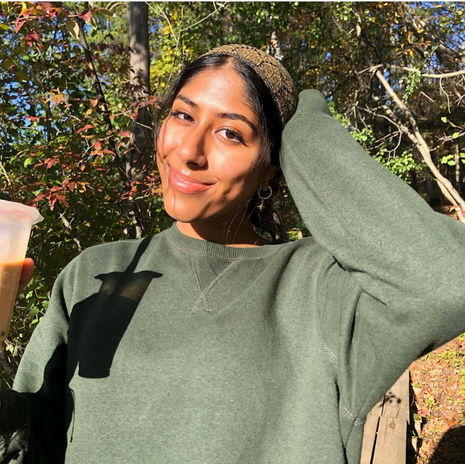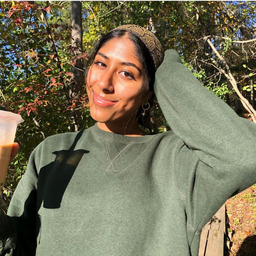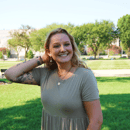Her Campus at American University had the wonderful opportunity to sit down with Kiran Waqar, this year’s Womxn of the Year for the College of Arts and Science. A junior at American University, Kiran has demonstrated incredible leadership and activism skills throughout her time on campus and beyond. She spoke with HCAU about the various organizations she’s part of, how she views the relationship between social activism and the arts, and more.
Her Campus American University: Why don’t you start by introducing yourself and telling us a little bit about who you are?
Kiran Waqar: My name’s Kiran Waqar, I use she/her pronouns, and I’m a junior at American University. I’m studying sociology and minoring in Arabic and transcultural studies. I’m from Vermont, and on campus I’m involved in Students for Justice in Palestine, the Muslim Students Association, and the Asian American Student Advocacy Committee.
HCAU: Tell me a little more about the organizations you’re involved in. What kind of work do you do in them?
KW: Students for Justice in Palestine has been at AU for a while, but it’s always been in different stages. A lot of the work we’re doing right now is getting it back on campus and helping students find it. Our work involves education and understanding Palestine in relation to all these other social issues we’re all talking about. It’s really about understanding root causes around racism, colonialism, and gender-based violence.
With the Muslim Students Association, much of what we do there is based around affinity spaces, making space for students to explore their own identities and what it means to be a Muslim culturally, religiously, interpersonally, etc. And in doing that we talk about what things we don’t see at AU, like what we need to be successful at this school, what we’re not getting that we can find through each other, and doing all of that through a place of community and bonding. Muslims are such a diverse group, so a lot of interesting conversations happen in that space.
With the Asian American Student Advocacy Committee, we spend a lot of time doing similar work but more focused on advocacy, and thinking about what Asian students aren’t getting at AU and how to build cross-solidarity links. Right now we’ve been working on how to get Asian courses at AU that aren’t catering just to white gays, that Asian American and Asian students can really benefit from.
HCAU: I saw that you’re also a co-founder of another organization called Muslim Girls Making Change, a slam poetry group dedicated to fighting for social justice. How did you get the idea to create that and what do you like the most about it?
KW: I started that organization when I was 15 with my friends here in Vermont, and honestly we started it because we were all Muslim girls in a really white state. It’s a pretty small, tight-knit community, and there are a lot of things we see happening in our own lives that people just aren’t talking about. So it really just started with us trying to figure out what it meant to be 15-year-olds in Vermont. And then we started doing poetry after we watched Youtube videos of people competing and realized we wanted to do that. We came back from the competition realizing how powerful that form of communication could be, and through it we built such strong communities and connections with other people.
We were able to speak about our experiences doing poetry, workshops, and working with other organizations, and we realized the stories we’re talking about aren’t just individual, but other people experience them too. It became this conversation of, how do we take storytelling and make it a way of building community? How do we build a community not just out of trauma and pain and hardship, but also joy and hope and companionship? It became this space of joy, having fun and living our best lives while also talking about issues that are really important. It really was a way for us to build a community with each other that goes outside just the four of us.
HCAU: That leads me into the next question, which is what do you think the relationship between the arts and social activism is?
KW: Art is always political, and the process of telling your story can be such a liberating, powerful act. We’re at AU, we’re at a private university, and it’s really easy to desensitize ourselves from what’s happening in the world. We like to pride ourselves on being the most politically active school, but that doesn’t mean we’re compassionate, that doesn’t mean we have empathy. I think when you’re trying to do good but you’re not coming from a place of compassion and community, you can end up doing a lot of harm.
Storytelling is one of those ways in which we maintain our humanity. Our stories are complicated, and I think when we’re able to tell our stories, we’re able to hold onto our humanity and that nuance that sometimes gets lost. Storytelling is a tool for political change and mobilization, and it’s also a way for us to protect ourselves. Being able to tell your own story and your own narrative is so important.
HCAU: I know you’ve been very involved in several social justice organizations, especially ones that focus on helping Muslim communities. What does the representation of Muslim womxn in the media, the government, etc. mean to you?
KW: I didn’t mention this before, but I’m also involved with this organization called HEART, and we do work around sexual health and sexual violence in Muslim communities. So we talk about that a lot there because the way Muslim womxn are portrayed in the media usually feels very commodified and monolithic, and we don’t really get to tell our own stories. That has an impact on the group at large, and it’s also very complicated because Muslim womxn are so diverse.
At HEART we talk a lot about how that hurts us because, for example, there’s an idea that Muslim womxn are super shy and reserved. That has an impact on sexual violence because there’s a narrative that Muslim womxn need saving, and that Muslim men are inherently abusive. Gendered islamophobia is real, gendered islamophobia shows up in the media, and we generally don’t talk about it. And when we do, it’s very male centered, and Muslim womxn often get lost in the narrative.
HCAU: Do you have any Muslim womxn that you particularly look up to or who inspire you?
KW: Contemporarily, Dr. Su’ad wrote this book called Muslim Cool, and she does super cool work looking at hip hop and black Muslim communities. Nadiah Mohajir is the founder of HEART and she does some really cool work around sexual health and advocacy. And then historically Muslim womxn have been very impactful, like Fatima al-Fihri creating the first university, and Nana Asmaʼu was an amazing poet and faith leader in West Africa. Muslim womxn are just dope, there’s so many who inspire me.
HCAU: Congratulations again on winning Womxn of the Year. How does it feel to win this award, and what does WOTY mean to you?
KW: It feels really great, I’m super honored. To me this award means that there’s a good community of people here who care about doing good, and it means I’m coming from a really cool community. Everything I do is community-based, so I’m really thankful that I have such cool people around me who have helped me, sent me so many resources, helped me learn so much, called me out when I’m causing harm, and are ultimately coming from such a place of love. I’m really thankful for my friends and everyone else in my life like that.

On behalf of Her Campus at American University, we would like to offer our sincerest congratulations to Kiran Waqar for winning this year’s WOTY award. We thank her for her efforts to advance equality and inclusivity on our campus, and we look forward to celebrating her and our other Womxn of the Year winners this Sunday at our annual event!
Photo: Her Campus Media


